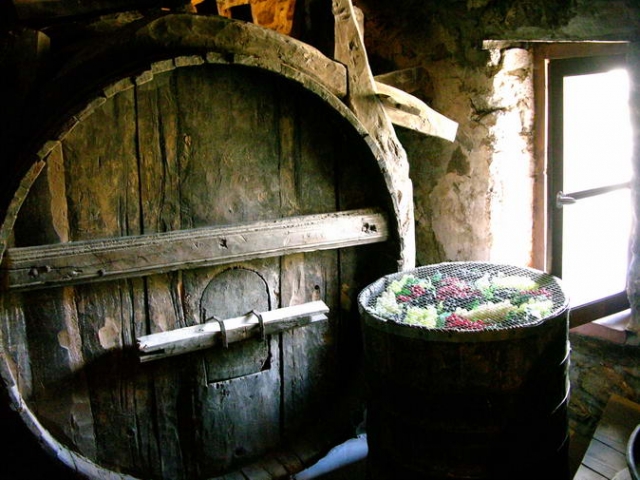Describe what you feel. You will be surprised by the poetry that a sip of wine provokes alone. Do not attempt to use the stock poetic "terminology" that specialists use. Wine is a subjective experience that expresses the relationship between you and it. However, a few poetic and distinctive expressions bring much more fun. What is better than raising one’s spirits? Isn’t it why we consume wine?
How wine obtains its colour?
Fresh grape juice is generally colourless. How are different wines obtained in terms of colour, namely white, rosé, red? And why is there such a huge variety of colours? The colour of wine is in the grape skin. The riper the grapes are, the more dye is in their skin. When mashing the grapes, the skin tears and interacts with the other part of the grapes by colouring it. The longer the skin is involved in the entire process, the more colour it attaches to the wine, making it darker and denser. In white wines, the contact of the skin with the remaining part is minimal, in rosé wines it lasts a few hours and their colour depends on the duration of that interaction. In red wines, the skin interacts with the rest of the wine throughout the fermentation. The question however is whether a dark grape variety can make white wine. The answer is positive and it is called "Blanc de noir" or white wine from black grapes.
The wine colour depends on the grape variety itself, as each variety has a different grain size, and skin texture and colour. Wine maturity and age are also important for its colour. Over time, the colour becomes lighter and changes.
The romance between wine and oak
Imagining a cool, dark cellar full of barrels with maturing wine brings a special mood. It is enough to read the bottle label and the picture fascinates us. It is wine makers’ pride and they often emphasize it.

Oak barrels have replaced animal skins and clay amphorae. There are other types of barrels but oak is an indispensable ruler when it comes to wine. It is solid, flexible and lends special flavour and these features make it so valuable. It is ideal for fermentation as well as for aging and storage. Most often the new barrels are reserved for the best wines, as oak aftertaste is strong and the tree has not been smoked to eliminate the taste of previous harvests. In modern times, oak taste can be added even if the wine is not maturing in oak barrels. It is a matter of views and technology.
Grape varieties and vineyards
There are over 5,000 different grape varieties that are called in thousands of different ways. About 150 are important for winemaking. The development of vineyards and the selection of the grape variety that is most appropriate for the terrain is a science that is at the beginning of wine making. Replanting cuttings, maintaining a specific density and height of the grapevines, the preferred humidity and composition of soil, all this is contained in the term "terroir" that can be generally translated as a feeling about the place - the combination of natural, geographical and other factors that give the variety its unique taste and flavour.
Among the varieties for white wines, we can mention Chardonnay, Sauvignon Blanc, Muscat and, for red wine,s Cabernet Sauvignon, Merlot, Pinot Noir, Syrah. As for rosé wines, it is important to know that they are obtained not by mixing red and white wines but by the duration of the contact between the grape skins and the wine.
The typical Bulgarian varieties include Mavrud, Muscat, Dimiat, Pamid, Keratsuda, Gamza.
The imported typical Greek grape varieties are Assyrtiko (from Santorini), Roditis (Peloponnese), Savatiano, Moschofilero, Ribolla, Xinomavro, Agiorgitiko, Limnio, Mavrodafni and Mandilaria.
Cork, glass or screwcaps?
There are four main ways to close wine. Each has its advantages and disadvantages. Cork is ancient, expensive and allows wine to breathe. However, it can change its taste qualities and spoil its valuable content. It has a sentimental value and a modern environmental importance. Artificial stoppers cannot spoil the wine, but they are what they are - cheap and artificial. They do not give a sense of antiquity and authenticity. Glass stoppers are expensive and uncommon. They are limited editions intended to attach sophistication. Screwcaps have recently become common, aiming to be a compromise between price, vision and the ability to preserve wine quality. However, we associate them with other types of drinks.
Is there a reason to wish good health with an alcoholic beverage?
What are the benefits of moderate wine drinking? We can find them in more than a few studies, including in those on the fight against heart attacks. Let us list some of them so that you can judge what is the right amount, since wine
- Reduces the risk of cardiovascular diseases, atherosclerosis, high blood pressure
- Purifies blood and prevents anaemia
- Stimulates metabolism and increases physical endurance
- Prevents tooth decay and infections of the respiratory tract
- Helps prevent inflammation of the gastrointestinal tract
It has even more benefits but I think these are sufficient. Adding to all that the fact that it stimulates good mood when consumed in moderation and with pleasure, it is not surprising that wine has accompanied man for thousands of years.
So, in Bulgaria we say "Nazdrave" (to your health) and in Greece "Στην υγειά μας", which has a similar meaning too.